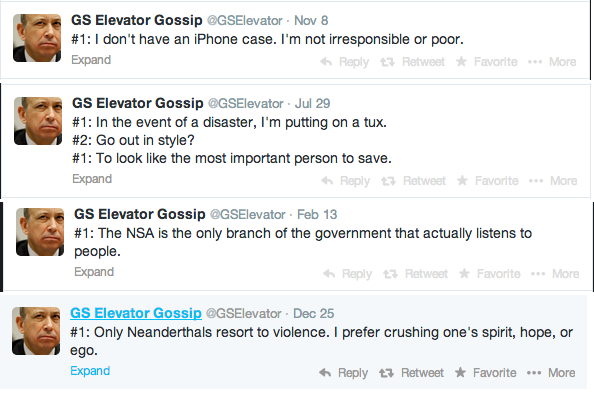In the age of endless information, the truth is everything—unless there is a funnier alternative.
In late February, everyone’s favorite sarcastic Twitter account, @GSElevator, was discovered to be the work of a former banker who had never worked a day at Goldman Sachs.
John LeFevre, a 34-year-old former banker now living in Texas was outed as the voice behind the rampantly elitist tweets that entertain more than 600,000 followers.
Then on March 6, LeFevre lost his six figure deal with Simon & Schuster. It would have brought his niche Twitter jabs at the banking industry to the large market with a book chalk full of detailed descriptions of the acrimony that goes down on Wall Street these days.
Whether the tweets are funny or not—most are if you have a sense of humor—LeFevre’s behavior raises real questions in the world of digital and print media. An imposter who for more than three years actually sparked an internal investigation at Goldman sold a book using information that what not necessarily his.
LeFevre has reiterated he keeps track of the quips that get tossed back and forth around the bars in Manhattan. And he did indeed work at a firm, Citigroup, for seven years, garnering necessary experience to inform his writing of the book.
His intentions were merely to entertain people and show the rest of the world just how out of touch these guys can be with the rest of the world. The account, which started in the heyday of the Occupy Wall Street movement, has succeeded in this respect. That is, if anyone actually believed he was overhearing these conversations in Goldman’s elevators.
Goldman Sachs responded to LeFevre’s ill fortune with its own sarcastic tweet, saying “guess elevators go up and down.” They linked this to a Business Insider article that highlighted the author’s demise.
Another Goldman spokesman said, “We are pleased to report that the official ban on talking in elevators will be lifted effective immediately.”
Goldman Sachs couldn’t care less, so they might as well beef up their own stereotype.
All jokes aside, the question of whether we are heading into a media world where identity and veracity do not hold the trump card is a troubling one. Of course, the publisher did the right thing in cancelling the book, but in a few years, this may not be such a foregone conclusion.
After all, books like “Wuthering Heights” have for centuries been published without true knowledge of who the author is. But in the 21st century, where we seem to hold objective information based on incontrovertible fact in the highest esteem, it’s important that the source is the first priority.
In a shifting landscape that now involves thousands of fictitious celebrity Twitter accounts and Facebook pages — which are all in good fun — the danger lies in that many take what they are reading for the truth.
There’s a big difference between believing someone is hearing off-color remarks in an elevator and buying the @FillWarrell account is actually run by the movie star.
LeFevre contends he did nothing wrong and was only using Goldman’s name as a reflection of Wall Street as a whole. He said, “Even socializing with them — going to bars and having guys buy girls drinks and then throw out a line like, ‘Don’t worry ladies, these drinks are on Goldman Sachs.’”
While his intentions in sharing a slice of exclusive culture with the rest of us aren’t disagreeable, LeFevre’s attempt to pull off a mystery writer aura a la Daft Punk fell flat on its face.
And for LeFevre right now, it may be time to cherish the wisdom of one of his phony elevator riders who quoth, “I wish I loved anything as much as I hate almost everything.”
Eli Haddow is a 21-year-old English and history junior from New Orleans.
Opinion: Twitter ambiguity raises questions on veracity
By Eli Haddow
March 12, 2014





